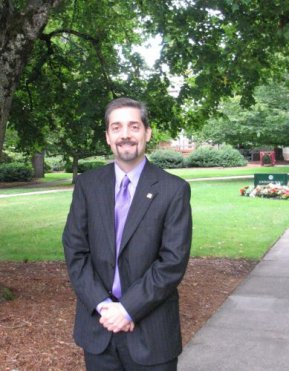EUGENE, Ore. -- (Sept. 15, 2010) -- Charles Martinez, vice president for institutional equity and diversity at the University of Oregon since 2005, has announced his intention to return to teaching and scholarship full time. Martinez will conclude his term of service as vice president effective Aug. 31, 2011.
"Charles Martinez has been a tireless champion for the UO's commitment to diversity and equity across campus. He has been a driving force behind the UO's highly successful diversity plan and the strategic action plans that are in place in every college, school and administrative unit," said University of Oregon President Richard Lariviere.
"Under Charles' leadership, the University of Oregon has seeded transformational institutional change that has brought us closer to realizing our highest aspirations of inclusive excellence. Both in terms of outcomes and the level of broad engagement of faculty, staff, students and external community members, there is no doubt that Charles has made a significant and lasting positive difference for the university," Lariviere said. "Though I am excited about the impact his future scholarship will make, his leadership will be missed."
Lariviere said he would consult broadly with stakeholders on campus, in the community and around the state prior to launching a national search for a successor to lead the university's diversity efforts. He expects to have a new vice president selected by the end of Martinez's term.
Martinez served as the key architect in advancing the University of Oregon's diversity plan, which was launched in 2006. The plan was developed and reviewed by more than 1,000 people within and outside the university and was built around the UO's core values of equality, opportunity and pluralism. Key to the plan's success was the call to action for every school and college to develop, implement, and evaluate the success of localized strategic action plans that address specific diversity goals within units.
During Martinez's tenure, the University of Oregon saw important increases in diversifying the ranks of faculty, staff and students. For example, there was a 72 percent increase in new freshmen of color at the UO between fall 2005 and fall 2009, compared with an 11 percent growth rate for students of color during the five years prior. Likewise, between 2005 and 2008, the UO saw a 16 percent increase among tenure-related faculty of color, a 50 percent increase among administrators of color and a 35 percent increase among classified staff of color.
During the past five years, the UO also saw success in supporting students of color through to graduation. A recent research report by The Education Trust found that the University of Oregon ranked 15th among top public research universities in terms of gains made in graduating minority students. In fact, the report showed that UO students of color graduated at rates higher than the overall UO student population. According to The Education Trust, the UO supported its minority students to six-year graduation rates of 67.1 percent compared with the overall UO six-year graduation rate of 65.3 percent.
"Charles has been extraordinarily effective in leading the state in diversity. He has made a significant difference at the UO in increasing the numbers of students from diverse backgrounds coming and completing their degrees. He has also made a significant impact on increasing the numbers of faculty of color at the University of Oregon. His contributions have been enormous," said Oregon State Board of Higher Education member Dalton Miller-Jones. A professor of psychology at Portland State University, Miller-Jones has served as vice provost for academic affairs at PSU and chaired the Black Studies Department since 2004.
"Charles has done an exceptional job of moving discussions of equity in our community forward by building on the work of the elders who came before him. It has been a long journey to get to where we are today. But thanks to Charles' professionalism, integrity and humility, the entire community is now able to take part in crucial and courageous conversations about how to build the best university possible," said Carmen Urbina, parent, family and community coordinator for Eugene School District 4J. "While we have made great progress, the work is not done yet. It is now up to us to build on Charles' accomplishments."
Martinez has served as a faculty member in the University of Oregon's College of Education since 1998. He will return to teaching and research full time once he steps down as vice president in August 2011.
"Through his scholarship, Charles Martinez has made significant contributions to our understanding of the risk and protective factors involved in linking acculturation to behavioral health outcomes for Latino families and in developing and testing culturally specific interventions for Latino families at risk. This is a topic of increasing importance to our state and our nation. I look forward to Charles returning to the College of Education and continuing his work on this vital subject matter," said Mike Bullis, dean of the College of Education.
Martinez was the first in his family to attend college. He graduated with honors from Pitzer College in 1991 with a degree in psychology. He completed his master's and doctoral studies in clinical psychology from the California School of Professional Psychology before coming to Eugene to complete a National Institutes of Health postdoctoral fellowship in 1997. Martinez also serves as a senior research scientist at the Oregon Social Learning Center in Eugene.
Contact: Julie Brown, UO media relations, 541-346-3185, julbrown@uoregon.edu
###